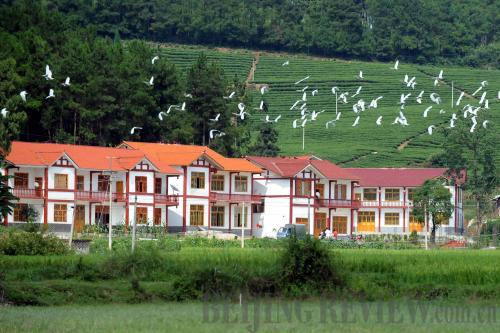|
Buoying rural demands
 |
|
HOUSING EFFORTS: Yuqing County in Guizhou Province has taken vigorous efforts to construct new houses in the countryside for farmers (XINHUA) |
Zhang Xiaoshan (Director of the Rural Development Institute under the Chinese Academy of Social Sciences): As China accelerates the shift to rely more on domestic demands, the rural market definitely presents a rich bonanza of consumers, though it will take some time to explore its full potential.
The No. 1 Document for 2010 has mandated subsidies for rural purchases of construction materials, a measure widely considered a powerful catalyst for farmers to bump up spending. It will also encourage them to build better houses and improve their livelihoods.
Since early 2009, the government has distributed subsidies, allowing farmers to purchase appliances and vehicles. The document said the program would be continued and widened to cover employees of state-owned farms and forestry firms.
Many migrant workers have returned to the countryside, bringing back urban consumption habits. This will surely pump some steam into the rural consumer market and help widen domestic demands.
But subsidies are still far from enough, and China still has a long way to go to drive up rural consumption. In 2006, consumption by Chinese farmers contributed 5.8 percent to the rural economy, compared with 34.3 percent of urban households.
As a result, the country should double its efforts to increase the income of farmers and offer them more job opportunities. Efforts are also needed to further perfect the social security net, including medical insurance, education and pensions, to add incentives for them to spend.
China has every reason to continuously spark buying interest of farmers, the country's largest group of potential consumers. A thriving rural consumer market would effectively wean the country off its dependence on exports and investments, and also absorb the industrial overcapacity, a serious conundrum for the Chinese economy.
Major Support Measures of the No.1 Document
1. Strengthen state support to agriculture and provide more social resources for rural residents
Increase government investments in rural infrastructures; continue with subsidies to farming and state purchases of corn, soybean and oil-bearing seeds; enhance financial services in rural areas, including small credit, village banks and insurance; encourage enterprises and other organizations to support social welfare for farmers; and distribute subsidies to rural purchases of construction materials, appliances and vehicles.
2. Accelerate the development of modern agriculture
Make efforts to increase grain yield and quality; encourage scale production of livestock and green food; improve irrigation and water supplies; build high-yield farmland; enhance scientific innovation and technological progress across the countryside; help expand the markets for agricultural products; and improve the rural ecological environment.
3. Improve the livelihood of farmers and bridge the urban-rural gap
Provide policy incentives for farmers to start up their own businesses and to propel rural education, culture and sanitation; improve the social security net for farmers; reinforce the construction of roads, waterways and hydropower stations; and make efforts to alleviate poverty in rural areas.
4. Deepen social system reforms of the countryside
Improve the land contract system; press ahead with reforms of the land management system; strengthen collective agricultural productions; push forward reforms in the forestry industry; strengthen the economic vitality at the township level; accelerate urbanization; and encourage city authorities to allow migrant workers who have stable jobs and live in the cities for a certain period of time to join urban housing programs. Also, expand exports and continue to open the countryside to the outside world.
5. Consolidate social management at grass-roots levels
Push forward advancements of grass-roots committees of the Communist Party of China; strengthen democracy at grass-roots levels; and ensure social stability in the countryside.
Statistics for Agriculture, Farmers And the Rural Area in China
The agricultural output value in 2009 stood at 3.54 trillion yuan ($519.6 billion), representing an increase of 4.2 percent year on year.
Grain output in 2009 was 530 million tons, 0.4 percent higher than one year earlier.
Rural investments in fixed-assets grew 27.5 percent to reach 3.07 trillion yuan ($449.7 billion) in 2009, 6 percentage points higher than one year earlier.
Per-capita annual net income for farmers reached 5,153 yuan ($755) in 2009, recording a growth rate of 8.5 percent year on year.
In November 2009, employed migrant workers numbered 152 million, higher than the level before the financial crisis.
(Source: National Bureau of Statistics) | 